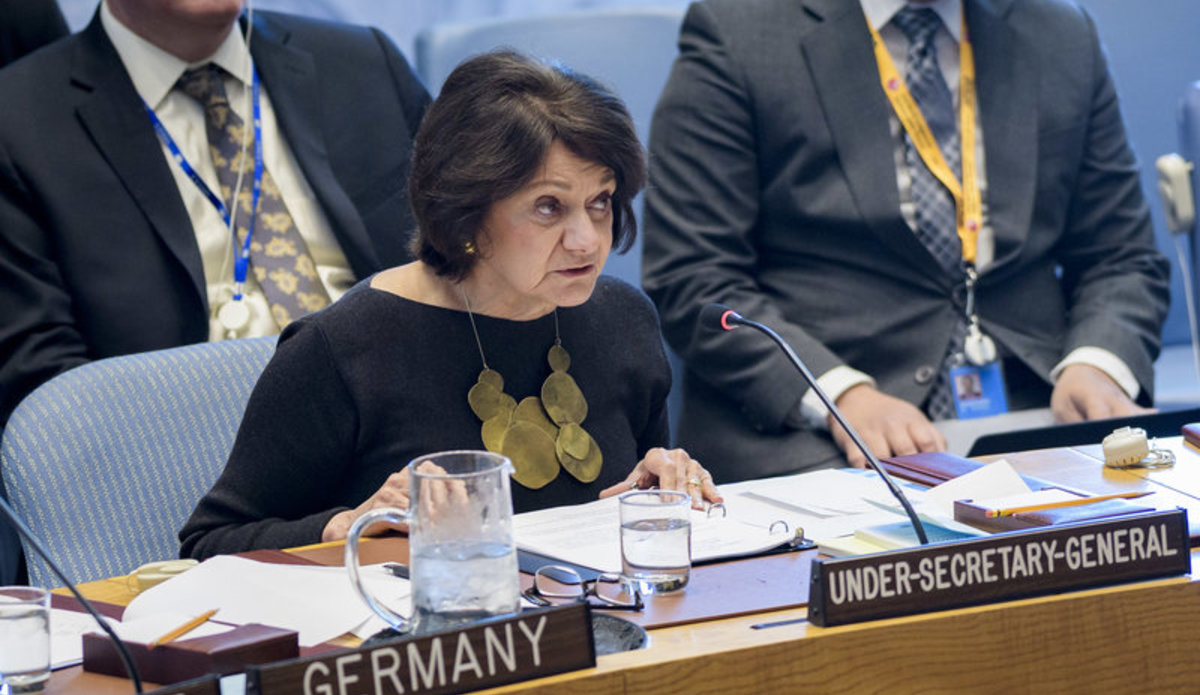Thank you, Mr President,
We are at yet another juncture in the Syrian conflict where civilians are paying the price for a never-ending war. We have been here before: in Aleppo, in Eastern Ghouta, and in Raqqa. Today it’s Idlib, where 3 million civilians are at risk.
Until recently the Russian-Turkish Memorandum of Understanding signed on 17 September 2018 had significantly reduced violence in northwest Syria. However, we now see increasing hostilities on the ground.
If the escalation continues and the offensive pushes forward, we risk catastrophic humanitarian fallout and threats to international peace and security.
Therefore, the UN welcomes the announcement made on 15 May of a Turkish-Russian working group as a means towards re-establishing a cessation of hostilities in northwest Syria. That cooperation is desperately needed.
Mr. President,
The UN has followed with great concern the dangerous intensification of violence in the de-escalation area of northwestern Syria, involving Syrian government forces and their allies, armed opposition forces, and Security Council listed terrorist group Hayat Tahrir al-Sham (or HTS).
Between February and March, we received reports of Syrian Government airstrikes resuming on areas inside the Idlib de-escalation area, of HTS stepping up its cross-line raids on government forces, and mutual exchanges of mortars and rockets.
We have continued to receive reports of HTS launching attacks on government areas, including a Russian airbase.
On 8 March, Turkey, in coordination with Russia, began patrols inside the “de-militarized zone”. We welcomed these coordinated patrols, which de-escalated violence somewhat. Yet, outside of patrol hours or patrols areas, attacks from both sides continued and increased significantly in late April.
On 6 May, government forces began a ground offensive, reportedly including Russian air support, opening two fronts: one in northern Hama and the other in northeast Latakia. As of 15 May, the government had seized several towns in northern Hama inside the “demilitarised zone”.
Turkey reports that two of its soldiers were injured on 4 May by government shelling on a Turkish observation post in northern Hama. As the fighting has moved closer to the observation post, Syrian government and Russian strikes were reported in close vicinity to the post.
Since late April, this escalation in violence has reportedly killed and injured over a hundred civilians and further displaced 180,000. The aerial bombardment is alarming, including the use of barrel bombs on populated areas.
Airstrikes, barrel bombs, shelling, and other fighting has damaged or destroyed have also reportedly hit multiple health facilities and schools in greater Idlib. Several of these had been deconflicted with the UN. There was also reported shelling from the de-escalation zone into areas under the government’s control, including a reported rocket strike on the Neirab camp for Palestine refugees.
We appeal to all parties to cease hostilities, uphold international humanitarian law and protect civilians. We condemn all attacks on civilians and civilian infrastructure, in particular medical facilities and schools, and urge the parties to respect the safety and neutrality of health and humanitarian workers.
The Secretary-General has called for an urgent de-escalation of the situation and urged the parties to recommit fully to the Russian-Turkish ceasefire arrangements. And he has urged the Astana guarantors—in particular Turkey and Russia—to ensure that this takes place. I strongly reiterate this appeal today.
Mr President,
The current escalation once again reminds us of the urgent need for a political solution to the conflict.
The international community agrees that the presence of HTS in Idlib must be addressed. But with 3 million civilians in close quarters, combatting terrorism cannot be allowed to supersede obligations under international law.
Special Envoy Pedersen has elaborated priorities for the political process. This Council has expressed support for his efforts. Alongside the urgent imperative to end the current violence in northwest Syria, we need to revitalize the UN-facilitated political track.
We must continue a sustained dialogue with the parties, building trust and confidence. We should work together in support of Russia and Turkey’s recommitment to a ceasefire on Idlib, then we can work towards restoring a nationwide ceasefire and focus on advancing the political roadmap in resolution 2254.
We need concrete action on the release of detainees and the clarification of the fate of missing persons. Reported estimates of the number of detained and missing since 2011 are well in excess of 100,000 people. The single greatest contribution that could be made now would be large-scale release of children, elderly, the infirm and women.
Much progress has been made toward convening a credible, balanced and inclusive constitutional committee. The UN continues to consult parties on a package addressing the committee’s composition and rules of procedure that would be acceptable to both the government and the opposition Syrian Negotiation Commission. With a bit of compromise, it could move forward. And that step could help unlock a broader political process.
International cooperation and support of the Geneva process is critical if Special Envoy Pedersen is to realize his mandate.
Mr President,
The conflict in Syria is complex, but there is a path forward.
Let us unite today for the first step – to support an immediate de-escalation of the violence in greater Idlib and work towards a political solution that meets the legitimate aspirations of the Syrian people.
Thank you, Mr President.

